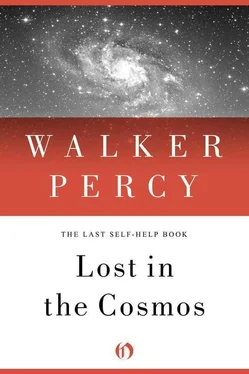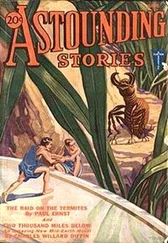Therefore, one might ask Sagan the same question he put to UFOers: Of all the countless bits of data received from outer space, the observations of astronomers, the millions of units recorded by radio telescopes, why has not a single bit of information been received which could not be attributed to the random noise of the Cosmos?
Question: Why is Carl Sagan so lonely?
(a) Sagan is lonely because, as a true devotee of science, a noble and reliable method of attaining knowledge, he feels increasingly isolated in a world in which, as Bronowski has said, there is a failure of nerve and men seem willing to undertake anything other than the rigors of science and believe anything at all: in Velikovsky, von Daniken, even in Mr. and Mrs. Barney Hill, who reported being captured and taken aboard a spacecraft in Vermont.
(b) Sagan is lonely because, after great expectations, he has not discovered ETIs in the Cosmos, because chimpanzees don’t talk, dolphins don’t talk, humpback whales sing only to other humpback whales, and he has heard nothing but random noise from the Cosmos, and because Vikings 1 and 2 failed to discover evidence of even the most rudimentary organic life in the soil of Mars.
(c) Sagan is lonely because, once everything in the Cosmos, including man, is reduced to the sphere of immanence, matter in interaction, there is no one left to talk to except other transcending intelligences from other worlds.
Thought Experiment: You are Sagan and you are monitoring the Cornell University radio telescope at Arecibo, Puerto Rico, when, after years of reception of random noise, you receive a signal which can only be interpreted as representing the prime numbers, 1, 2, 3, 5, 7, 11, 13, 17, 19, 23 … Communication is established! The source of the transmission must be Alpha Centauri because of the direction and the transmission time: four years. Years pass. A code is agreed upon. But time is running out. You are growing old. What with the difficulties of encoding and decoding and the period of transmission, there is only time for five simple questions. Which questions would you ask, and how would you answer these five questions from Alpha Centauri?
(1) Are you in continuity with other organisms on P-3, S-G2V (third planet = earth, star G2V = our sun)?
(2) If not, what is nature of discontinuity?
(3) Are you in trouble?
(4) If so, specify.
(5) What information do you need? (E.g., what can we do for you?)
(18) The Demoniac Self: Why it is the Autonomous Self becomes Possessed by the Spirit of the Erotic and the Secret Love of Violence, and how Unlucky it is that this should have Happened in the Nuclear Age
SÖREN KIERKEGAARD MADE a very strange statement. He said that Christianity first brought the erotic spirit into the world. In his arcane style, which often seems designed as much to obfuscate as to enlighten the reader, he wrote: “Sensualism, viewed from the standpoint of Spirit, was first posited by Christianity.” Which is to say, not that sensuality had not existed in the world before in paganism, perhaps in its most perfect expression in Greece, “but not as a spiritual category.” It existed rather as an expression of harmony and unison. “In the Greek consciousness, the sensuous was under the control of the beautiful personality or, more rightly stated, it was not controlled, for it was not an enemy to be subjugated, not a dangerous rebel who should be held in check.” But in the Christian era the sensuous-erotic becomes “a qualified spirituality, that is to say, so qualified that the Spirit excludes it; if I imagine this principle concentrated in a single individual, then I have a concept of the sensuous-erotic genius. This is an idea which the Greeks did not have, which Christianity first brought into the world, even if only in an indirect sense.”
The highest expression of the sensuous-erotic genius, in Kierkegaard’s view, was Mozart’s Don Giovanni: “Mozart is the greatest of classic composers and Don Giovanni deserves the highest place among all classic works of art.”
What is arresting here is Kierkegaard’s view that the Don is to be understood not merely as a roué, a dirty old man reverted to his animal appetites, a sinner, or even as a good pagan, a Greek hedonist, but rather as “the inspiration of the flesh by the spirit of the flesh.”
Nor is the “sensuous-erotic” to be understood in modern biological terms as the sex drive and need-satisfaction, but rather as the sensual “spirit” and therefore, in Kierkegaard’s word, as the “demoniac.”
It is this “demoniac” spirit of the erotic which is “posited” by Christianity.
Presumably, Kierkegaard would have no difficulty explaining that national characteristic which has astounded so many foreign visitors to this country: that the United States is at once the most Christian of nations (at least in numbers of churchgoers) and at the same time the most eroticized society in all of history.
For our purposes, which is a much more modest and dialectically less sophisticated approach to such matters, there are two things of value in Kierkegaard’s notion of the “spirit of the sensuous-erotic,” and I acknowledge the debut fully aware that this particular passage from Kierkegaard was written under one of his pseudonyms and in “the esthetic stage of existence” and hence not necessarily approved by Kierkegaard writing in his “religious stage.”
One thing of value is his setting aside the “sensuous-erotic” as a category to be examined in its own right, a category which not only is not to be dismissed as simply sinful but which can in fact produce works of the highest genius, in Kierkegaard’s term, “the musical-erotic genius” of Don Giovanni. Thus, we are dispensed from the necessity of uttering the usual denunciations of the present age, familiar from both Christian and non-Christian sources, and adducing the usual statistics about the rise in teenage pregnancies, pornography, sex in the media, child molestation, rape, and so on. And dispensed as well from the usual rhetoric of the “sexual revolution”—the Don would have made an ideal subject of a Playboy interview or Playgirl centerfold (Hugh Hefner in fact might be described as a latter-day, rather washed-out Don; if he were set to music, it would not be by Mozart but by Mantovani) — even to the point of blaming all the woes of the Western world on the repression of sexuality by Christianity. Such denunciations and defenses are remarkable chiefly for their sterility. There is something more than a little dreary about the present standoff between the “sexual revolution” and the Christian counterrevolutionaries. It usually comes down to the Reverend Jerry Falwell confronting Bob Guccione, editor of Penthouse, on a talk show. Both men do their usual numbers, the viewer takes sides, and that is that.
But Kierkegaard gives us leave to see both, both Jerry Falwell and Bob Guccione, from a different perspective, as if the TV camera had been dollied backstage, from which vantage point we can see both Guccione and Falwell plus the talk-show host plus the studio audience and form some notion of what is going on with all of them.
Even more valuable is Kierkegaard’s characterization of “the spirit of the sensuous-erotic” and his use of the quaint word “demoniac.”
“Demoniac” implies possession of the soul by an unbenign spirit. Such a notion comports well with our far more modest semiotic description of the self, not necessarily as a soul or spirit, but in minimal terms as that semiotic entity which is unique in its ability to understand the world but not itself. The science of the scientist can understand everything in the Cosmos but the self of the scientist. It, the self, is therefore a “spiritual” entity, if you like, but an entity anyhow subject to its own modes of existence, triumphs, and disasters and, in this age, its own peculiar predicaments. Not the least benefit of semiotics and Kierkegaard is that we are delivered from the debilitating strictures of modern psychology, which has not the means of saying anything at all about the self, let alone spirit.
Читать дальше












